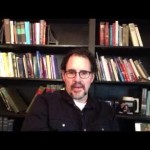We run our website the way we wished the whole internet worked: we provide high quality original content with no ads. We are funded solely by your direct support. Please consider supporting this project.

What Unfulfilled Prophesies Say About the Open View
Image by Lori Greig via Flickr
Yesterday, we posted about how Messianic prophesies are understood in the open view of the future. Today, this post will look at prophesies that are not fulfilled in the way predicted and what that can tell us about the open view of the future.
In John Goldingay’s excellent multi-volume work, Old Testament Theology, he highlights an important, but almost universally overlooked, aspect of Old Testament prophecy. In sharp contrast to the standard ancient Greek view of prophecy, inspired prophecies in the Old Testament (and, I would add, at least one in the New Testament, see Ac 21:10-11, cf. 26-33) are not always fulfilled, at least not in the exact way they were originally prophesied.
For example, Jeremiah prophesied that Jehoiakim would die a dishonorable death. It is said that no one would mourn for him and that his corpse would be dragged around and thrown outside the gates of Jerusalem, left unburied to decompose in the sun (Jer. 22:18-19, cf. 36:30). Not only this, but it was prophesied that no descendent of his would sit on the throne (Jer. 36:30-31). As it turned out, however, Jehoiakim received a proper burial and his son succeeded him as king (2 Kg. 24:6). What are we to make of this?
Something similar is true of Jeremiah’s prophecy to Zedekiah. Jeremiah declares to Zedekiah that the Lord says “You will not die by the sword” but will rather “die peacefully.” The Lord adds that people will mourn his death (Jer. 34:4-5). As it turned out, however, Zedekiah was captured by the Babylonians, had his eyes plucked out and died in prison (Jer. 52:8-11). What’s most interesting is that both the prophecy and the record of events revealing that it wasn’t fulfilled are included in the same book, demonstrating that Jeremiah and/or the compilers of this work weren’t at all bothered by the fact that the prophecy didn’t come to pass.
Perhaps most impressively, in Ezekiel 26-28 we find a lengthy prophecy against the city of Tyre. It is said that Nebuchadnezzar, King of Babylon, would utterly defeat Tyre, killing its inhabitants, plundering all its wealth and leveling all its walls so that it ends up being flat as a rock. Indeed, it is prophesied that it would virtually vanish from the earth and never be found again. Well, it didn’t quite happen that way, as Goldingay notes.
Nebuchadnezzar did lay siege to Tyre, but, while he did gain some control of the city, it was “nowhere near as decisive as Ezekiel had implied” (Old Testament Theology, Vol. II, 83). The city wasn’t completely conquered and laid flat until Alexander did this several hundred years later.
Because his campaign failed, Nebuchadnezzar failed to get much of Tyre’s wealth. So, says Goldingay, Yahweh made “ a new decision.” He decided to turn Egypt over to him in order to repay him for his expenses in his “vain effort” to take Tyre (Ezek. 29:17-20; Goldingay, ibid., 84). The amazing thing is that this campaign also seems to have failed! Nebuchadnezzar invaded Egypt, but “the achievement did not amount to conquest” (op.cit.),
As with Jeremiah, Goldingay is impressed with the fact that Ezekiel and/or the compilers of this work seem totally untroubled by these “unfulfilled” prophecies. He surmises that this is due to the fact that, despite Ezekiel’s strong emphasis on divine sovereignty, he accepts that “human beings exercise real freedom in the world and do not have to cooperate with God’s will.” The prophecies announce God’s plan, but as Goldingay repeatedly emphasizes, a plan is not an unalterable script. When humans resist his will, Yahweh “reworks the plan” rather than coercively bulldoze over them (op. cit.) When the Old Testament speaks of a divine plan therefore, “this is not a design for the detail of history…but an intention for the present context.” So, Goldingay concludes, “The assumption that everything that happens in the world emerges from God’s plan stands in contrast with the more concrete way in which the Scriptures speak of God’s plan. God’s plan refers to the way God works out specific details of an overall vision as decades unfold, in interaction with human actions.” (ibid., 85).
The phenomenon of unfulfilled prophecy tells us a lot about how different ancient Hebrews viewed prophecy from the way ancient Greeks viewed it and the way most today view it. It also reveals how flexible the sovereign Lord is in his dealings with humans as free agents (on this, see also Jere. 18:1-10). Though Goldingay doesn’t draw this conclusion, I would suggest that the phenomenon of unfulfilled prophecies implies that the future is somewhat open and that the omniscient God knows it as such. At the very least, it seems to me the Open View of the future can accommodate unfulfilled prophecies much easier than the classical view in which all facts about the future are eternally settled and known by God as such.
Category: General
Tags: Free Will, Future, Goldingay, Open Theism, Prophesy
Topics: Open Theism
Related Reading

What God Doesn’t Know (According to W.L.Craig)
Hello bloggers. Here’s Part II of my response to Bill Craig’s podcast critique of the open model of providence. As I see it, the central difference between Craig’s position (Molinism) and my own (open theism) boils down to our different assessments of futurity. As I noted in my previous blog, Craig believes that propositions asserting…

The Lego Movie & Free Will
Last week Greg tweeted about two movies that have themes related to human free-will and God’s control of the world. They were: @greg_boyd: Does God want a permanently frozen “perfect” world or an open-ended world filled with wildly imaginative people? Watch “The Lego Movie”! @greg_boyd: Meantime, me & some peeps are going to watch (again!)…

Free Will: Are studies that demonstrate genetic determinism a threat to free will?
Greg shares his continuing thoughts on free will with a thought experiment (and a hand-drawn graph!) granting that we are largely determined by forces outside of our control. If we grant this presupposition, does that mean that free will is an illusion or insignificant? Find out!

What Hinders Answers to Prayer
Prayer is powerful and effective, but it’s not magic. There is no automatic guarantee that what we’re praying for is going to come to pass, even when we’re praying with faith and in accordance with God’s will. Prayer is a form of co-laboring with God to change the world in a Kingdom direction. Yet, it’s…

Is exhaustively settled foreknowledge essential to God’s identity
In this episode Greg discusses several passages in Isaiah that imply God’s foreknowledge is a primary differentiator between Isaiah’s God and all other gods. Links: Greg’s book: “God of the Possible“ http://traffic.libsyn.com/askgregboyd/Episode_0023.mp3

What about the Gospel of John and Calvinism?
Question: The Gospel of John seems to teach that people believe because God draws them, rather than that God draws people because they believe. If this is true, how can you deny the Calvinistic teaching that salvation is based on God’s choice, not ours? Answer: As you note, many people find support for the view…
